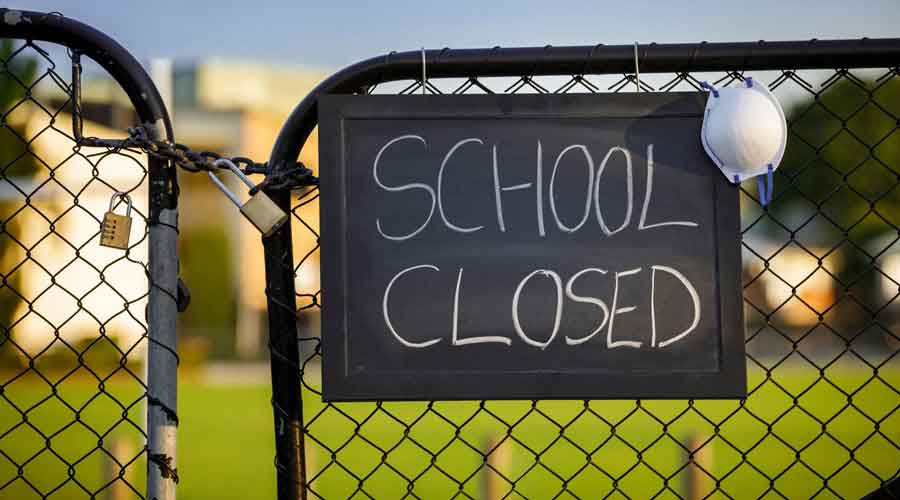
Pandemic and school closure cause regression in learning, affect mental health of children
Don't Miss
The parliamentary standing committee recommended accentuated vaccine programmes for all students, teachers and allied staff
 |
| The committee recommended intensive bridge courses to make up for the learning loss when schools reopen. Shutterstock |
The parliamentary standing committee on education in its report on “Plans for Bridging the Learning Gaps” presented in Parliament on Friday recommended prioritising vaccination for students, teachers and other employees to reopen schools.
The committee headed by BJP parliamentarian Vinay Sahasrabuddhe also said that the pandemic has widened the learning chasm, affecting the weaker sections the most.
Appearing before the committee, the school education department secretary said according to a survey by the Central Board of School Education (CBSE), 85 per cent children are studying online while the rest are being reached personally. These 15 per cent students are receiving study materials from their teachers and can contact the teachers if they face difficulties.
The CBSE is the country’s largest school board.
“The last-minute postponement of examinations coupled with the news appearing in newspapers and the media about the pandemic has affected the mental and physical well-being of the children,” the report said.
Learning among peers not only addresses the academic needs of children but also helps develop their social abilities, it said.
“The closure of schools has impacted the social fabric of the family in a negative manner, leading to early/child marriage and increased involvement of children in household chores,” the report said.
The representative of the Union Territory of Jammu and Kashmir told the committee that children in many places in the Valley were not being able to participate in online classes because of feeble Internet connectivity. Community classes with small groups of students are being held in some places.
Learning loss
The committee cited a January 2021 study by a research group of Azim Premji University in 44 districts of Chhattisgarh, Karnataka, Madhya Pradesh, Rajasthan and Uttarakhand, covering 16,067 children of Classes II to VI at 1,137 schools.
The study found that 92 per cent of the children had decreased prowess in at least one language and 82 per cent had forgotten at least one mathematical lesson from the previous class.
It recorded a “widespread phenomenon of regression (forgetting) by students of learning from the previous class. This includes loss of foundational learning abilities such as reading with understanding and performing addition and multiplication, which they had learnt earlier and had become proficient in”.
This regression will impact “conceptual understanding across subjects” and affect future learning in school and college, the report said.
Another study by the department of school education at the Kendriya Vidyalayas found that 26.4 percent students, 15.7 percent teachers and 25 percent parents considered distance learning difficult while 33.8 percent students, 29.6 per cent teachers and 27.2 per cent parents found the experience joyful.
The committee said non-availability of digital devices and technical infrastructure with students, teachers and schools, patchy Internet, power outages, limited awareness on online education and lack of adaptation had contributed to learning loss among students.
Recommendations
The committee recommended intensive bridge courses to make up for the learning loss when schools reopen. It also suggested a credible system of continuous assessment throughout the year.
The committee recommended accentuated vaccine programmes for all students, teachers and allied staff so that schools may start functioning normally at the earliest.
It suggested holding classes on alternate days or in two shifts to thin out students, besides thermal screening, maintaining physical distancing and compulsory wearing of face masks.
The committee proposed that the government set up at least one school in every district and tehsil, and adopt a learning method that blends online and offline.
Prof. Anita Rampal, former dean of the faculty of education of Delhi University, said girls had been badly affected, with many of them possibly dropping out of the education system. They will become more vulnerable to the regressive demands of patriarchy and often lose their ability to resist early marriage or other unjust burdens, she said.
“When girls go to school, they get confidence. They get to understand the world outside, to feel inspired by others, to resist early marriage and even domestic violence. Their friends offer social support and reassurance in their resistance,” Rampal said.
“Thus going to school enhances their agency against unjust treatment and expands their horizon to aspire for a purpose in life, which they are often denied. They will lose these aspirations when they drop out. Due to Covid and school closure, many children have suffered physically and emotionally. All such children should be identified with special care, given emotional support and brought back into formal education,” she added.



0 Response to " Pandemic and school closure cause regression in learning, affect mental health of children"
Post a Comment
Disclaimer Note:
The views expressed in the articles published here are solely those of the author and do not necessarily reflect the official policy, position, or perspective of Kalimpong News or KalimNews. Kalimpong News and KalimNews disclaim all liability for the published or posted articles, news, and information and assume no responsibility for the accuracy or validity of the content.
Kalimpong News is a non-profit online news platform managed by KalimNews and operated under the Kalimpong Press Club.
Comment Policy:
We encourage respectful and constructive discussions. Please ensure decency while commenting and register with your email ID to participate.
Note: only a member of this blog may post a comment.